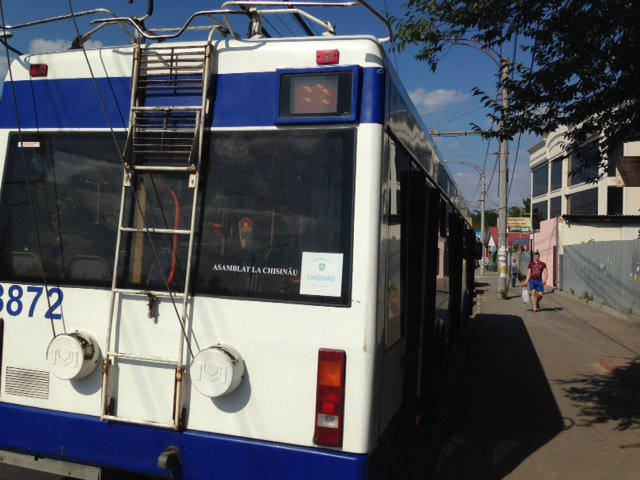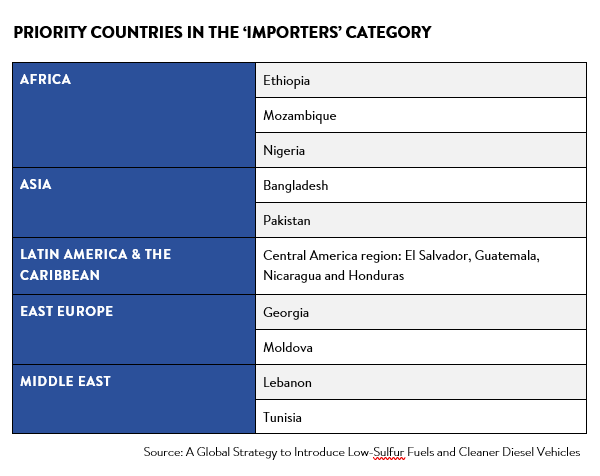This article is by the Climate and Clean Air Coalition.
Toxic exhaust fumes generated by ageing diesel vehicles will soon be eliminated from Moldova following the adoption of a ground-breaking new law in February 2019 – the country’s first to target fuel quality. As a result, local people can look forward to longer lives, cleaner streets, improved living standards and more choice of hybrid and electric vehicles.
The law, hitching Moldova’s road fuels up to specifications in European Union (EU) fuel quality directive 98/70/EC, is a major step for the East European country. Fuel quality restrictions had been absent from Moldova due to diverse factors, including the dependency on transport fuel and vehicle imports from neighbouring countries as well as the use of former Soviet Union standards. This created adverse effects on air quality. By contrast, the EU fuel quality criteria, with which Moldova is converging, rank with the strictest in the world.
“Previous to this measure, we had no regulation on fuel quality, and had therefore been importing fuel of a range of different qualities from non-EU countries. Some of this was very low grade. When offered, higher quality fuels had to compete with lower quality fuel on the basis of price,” explains Stela Drucioc, the Climate and Clean Air Coalition’s focal point at the Moldovan government’s Ministry of Environment.
Desulfurisation
Both petrol and diesel are affected, but the legislation will make a particularly big imprint on the diesel market because diesel accounts for around 70% of fuel imports. At the same time, diesel vehicles account for 57% of new registered imported vehicles in 2015, according to the Moldova Global Fuel Economy Database.
Diesel and petrol imports must now have a maximum sulfur content of 10 parts per million (ppm). That compares to a maximum previously of 350 ppm from non-EU imports – well above levels considered healthy or environmentally friendly by scientists. Cleaner diesel is more expensive to produce, so desulfurisation in the longer term works as a disincentive to diesel vehicle manufacture.
Sulfur is a major source of toxic substances including fine particles (PM2.5), considered a cause of premature death from cardiovascular disease and cancer, and black carbon, a short-lived climate pollutant. Hence, the country transitions in a single step from high-sulfur fuel to desulfurisation by excluding anything other than the new ultra-low sulfur fuels – the best on the market. The population can expect to be healthier in consequence.
Low-hanging fruit
Meanwhile, Moldova retains its place as a front-runner for upgrading not only fuels but also vehicles, as outlined in the Coalition’s 2016 Global Sulfur Strategy. The strategy’s objective is to decrease road diesel pollution worldwide. This has stimulated and informed the Moldovan government’s new policy. It aims for the near-elimination of on-road high-sulfur fuels and paves the way for reductions of 90% or more in fine particle emissions and black carbon from roads globally.
Countries such as Moldova represent ‘low-hanging fruit’ in the drive to abolish high-sulfur diesel because, as importers, there are fewer barriers to harmonisation with better fuel standards. Unlike countries that produce or refine fuel, importers do not need to invest in modifications to domestic refineries. At the same time, Moldova’s position adjacent to EU markets with higher standards made it an obvious candidate for the rapid transition to the ultra-low-sulfur fuels readily available from these economies.
“Moldova’s geographical location means it can benefit from advances in the European Union. The Coalition supports the harmonization of regional soot-free fuel quality and vehicle emission standards among countries that share a common market for fuels and vehicles. Moldova is an excellent case for a fast transition,” comments Denise Sioson, coordinator for the Coalition’s Heavy-Duty Vehicle initiative, which works to achieve major reductions in black carbon through the adoption of clean fuel and vehicle regulations and supporting policies.
Establishing the baseline
Hazy knowledge of the status of fuel quality and incoming vehicle technology had been holding back the government’s policy development, preventing a clear definition of current conditions. However, assistance from the Coalition set it on track, accelerating the adoption of the new law through a series of data collection and training initiatives that clarified the status quo.
“The Coalition and UN Environment played a really big role as catalyst in the speedy achievement of results,” comments Stela Drucioc, drawing attention to the development of the Fuel Economy Database on newly registered vehicles. The adoption of fuel quality standards, assessment of Moldova’s incoming fleet, and survey of current fuel quality was supported by the Coalition’s Heavy-Duty Vehicles Initiative in partnership with UN Environment and the Global Fuel Economy Initiative (GFEI).
Since the database completion in 2018, the Moldova Ministry of Environment now has a baseline for auto fuel consumption and CO2 emissions from its incoming fleet. Using data on vehicle imports since 2005, investigators identified the fuel consumption and emissions in the sector.
“Developing a more complete picture of the fuel quality and vehicle emissions situation in Moldova is key for planning future policy and projecting both CO2 and non-CO2 emissions reductions. Moldova’s steps in adopting cleaner, more efficient vehicles will allow consumers to choose and access the best technology available on the market – including electric vehicles,” explains Elisa Dumitrescu, Programme Advisor at UN Environment, which supported the project.
Under the Coalition’s Supporting National Action and Planning (SNAP) Initiative, which helps countries scale up action on short-lived climate pollutants in a coordinated and prioritised way, experts also helped build capacity in several tools and techniques. This includes sector inventories, monitoring and reporting on air pollution, including black carbon. This is required of Moldova under the Convention on Long-Range Transboundary Air Pollution (LRTAP), which covers emissions from elements such as sulfur, and compounds such as nitrogen oxides, amounting to around 26 air pollutants.
Success story
For countries in a similar position, Moldova’s story acts as a signpost to an attractive route ahead: a series of steps available at relatively little cost. Their journey is likely to be smoother if, like Moldova, these countries not only import fuels but also vehicles from neighbouring markets with higher standards.
For sure, the population of Moldova will have become aware of the negative impact evident from premature deaths due to sulfur in road fuels. Indeed, it is estimated that 80,000 premature deaths from transport-related air pollution occur each year in countries that have not updated their standards. The low sulfur transition in such countries would result in 7,000 avoided mortalities annually by 2020 and 40,000 avoided mortalities annually by 2025, according to the International Council on Clean Transportation. Abolishing dirtier fuels thus provides an easy win in terms of public health.
Cleaner vehicles
But there are other advantages. By upgrading their fuels, importers also leap several rungs up the cleaner vehicle scale because desulfurisation encourages a switch to advanced fuels and vehicles designed to accept them.
That means Moldova and other countries in a similar position can look forward in the medium term to an obvious progression on their roads from a modernised, cleaner fleet of conventional fossil fuel vehicles to an influx of electric and zero-emissions vehicles. For Moldova, a country dependent on fuel and vehicle imports that has applied to join the EU, upgrading to cleaner fuels is just one component of the higher standard of living it expects from membership.
Nonetheless, plenty of work still remains, including the transition to EU vehicle standards, which specify limits for air pollution from engines. New vehicles and road vehicle engines in Moldova will eventually need to show that they meet these limits to be approved for import.
“Moldova has imported good cars from manufacturers in Germany, for example, but poor emissions are still being produced by poor quality cars – no matter what the fuel. Vehicle standards facilitate imports of good quality vehicles and prohibit import of low-grade, older cars,” explains Stela Drucioc. Using support from the Coalition, the government is also considering new taxes for cars based on emissions.

